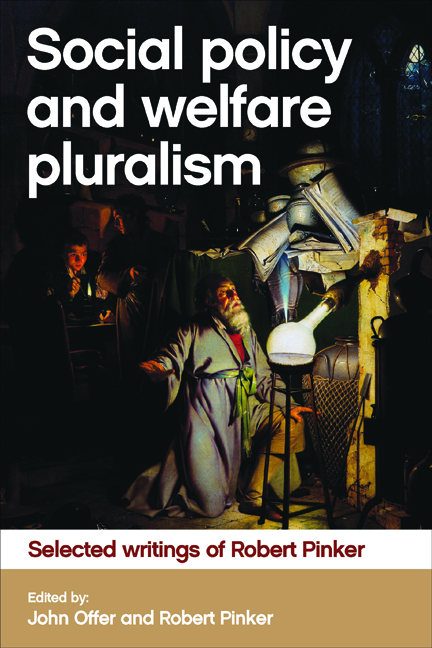Book contents
- Frontmatter
- Contents
- Acknowledgement
- Preface
- General introduction: Robert Pinker on rethinking approaches to welfare
- Introduction to Part One On social policy studies
- one The ends and means of social policy: a personal and generational perspective
- two Social theory and social policy: a challenging relationship
- three Stigma and social welfare
- four The welfare state: a comparative perspective
- five Richard Titmuss and the making of British social policy studies after the Second World War: a reappraisal
- Introduction to Part Two On social care, communities and the conditions for well-being
- six Report of the Working Party on the Role and Tasks of Social Workers: an alternative view
- seven The quest for community: from the Settlement Movement to the Griffiths Report: an historical perspective
- eight Citizenship, civil war and welfare: the making of modern Ireland
- Introduction to Part Three On welfare pluralism
- nine Golden Ages and welfare alchemists
- ten From gift relationships to quasi-markets: an odyssey along the policy paths of altruism and egoism
- eleven The experience of citizenship: a generational perspective
- twelve The right to welfare
- thirteen The prospects for social policy in the UK after the 2015 General Election
- Afterword On the post-Brexit prospects for social policy in the UK
- References
- Index
thirteen - The prospects for social policy in the UK after the 2015 General Election
Published online by Cambridge University Press: 08 April 2022
- Frontmatter
- Contents
- Acknowledgement
- Preface
- General introduction: Robert Pinker on rethinking approaches to welfare
- Introduction to Part One On social policy studies
- one The ends and means of social policy: a personal and generational perspective
- two Social theory and social policy: a challenging relationship
- three Stigma and social welfare
- four The welfare state: a comparative perspective
- five Richard Titmuss and the making of British social policy studies after the Second World War: a reappraisal
- Introduction to Part Two On social care, communities and the conditions for well-being
- six Report of the Working Party on the Role and Tasks of Social Workers: an alternative view
- seven The quest for community: from the Settlement Movement to the Griffiths Report: an historical perspective
- eight Citizenship, civil war and welfare: the making of modern Ireland
- Introduction to Part Three On welfare pluralism
- nine Golden Ages and welfare alchemists
- ten From gift relationships to quasi-markets: an odyssey along the policy paths of altruism and egoism
- eleven The experience of citizenship: a generational perspective
- twelve The right to welfare
- thirteen The prospects for social policy in the UK after the 2015 General Election
- Afterword On the post-Brexit prospects for social policy in the UK
- References
- Index
Summary
Introduction
This essay begins with a brief overview of the two main traditions of ideological thought that have shaped the ends and means of social policy in the UK over the past century. I go on to review the social policy proposals set out in the Conservative and Labour Party 2015 election manifestos. I follow this review with an appraisal of the way in which the government clarified its post-election policy intentions in three keynote speeches as it prepared the ground for the Chancellor's presentation of his July Budget.
The focus then shifts to the Chancellor's presentation of his Budget, Labour's response to his budget proposals, the concurrent progress of its leadership election campaign and its eventual outcome. In the concluding part of this essay, I speculate on the diversity of ways in which these events, and their ideological implications, might shape the prospects for social policy in the UK over the next five years.
Comparing the ideological options
I started watching the declaration of results on election night 7 May 2015 hoping that the outcome would be another hung Parliament and a continuation of some form of coalition government. As a traditional middle-of-the-road ‘One Nation’ Conservative, my preference was for a renewed partnership with the Liberal Democrats. As a middle-of-the-road welfare pluralist, the prospect of either the Conservatives or Labour gaining a secure working majority in Parliament filled me with apprehension.
As a welfare pluralist, I share William Keegan's view that the most successful democratic Western economies have built their achievements on ‘a policy mix of the invisible hand of the market and the visible hands of public institutions’. In the context of this ‘policy mix’, welfare pluralism takes the form of a mixed economy of statutory and non-statutory private and voluntary sectors in which agreement on the relative importance to be attached to each of these sectors is reached through a process of pragmatic compromises between a plurality of interest groups of different ideological persuasions.
Middle-of-the-road compromises of this kind are more likely to be achieved in coalition governments where it is difficult for any one of the collaborating parties to dominate the policy making process.
- Type
- Chapter
- Information
- Social Policy and Welfare PluralismSelected Writings of Robert Pinker, pp. 269 - 294Publisher: Bristol University PressPrint publication year: 2017



